Share
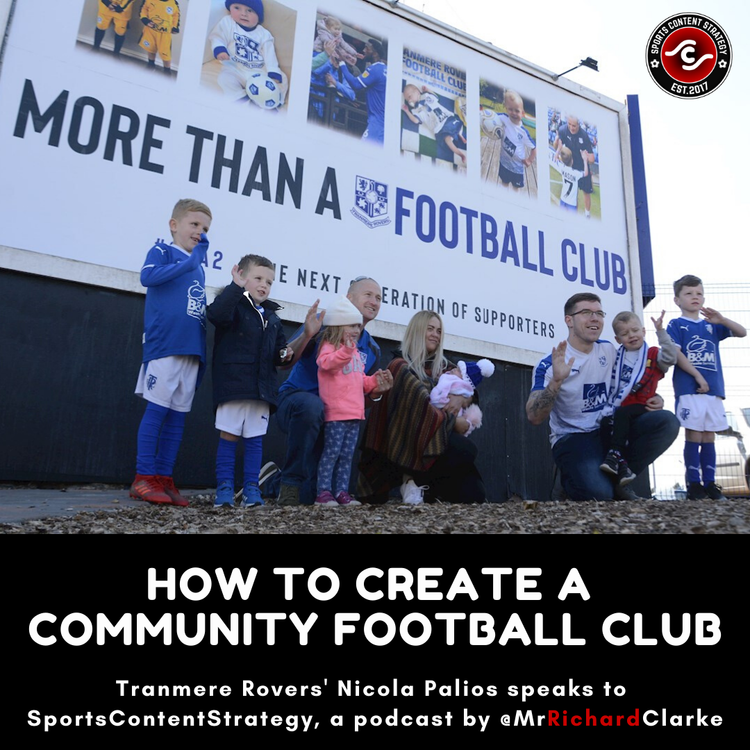
Sports Content Strategy with MrRichardClarke: Exploring sports content, journalism, digital and social media
Nicola Palios: How to create a community football club
TOPICS Do they consider themselves a success story?
The acceptance that was an emotional decision to buy the club
How a conversation on holiday after listening to Tranmere’s relegation on the radio prompted the purchase of the club
Asking the hard questions to the previous owner and why the deal nearly faltered
They had financial and legal backgrounds but what did they lack?
Did Nicola encounter sexism when they took over in 2014
What about more passive comments like ‘Is your husband there?”
The three phases of the five-year plan - create space, change business plan, look for investment
Changing the dialogue with the fans
How they communicated a ticket price increase after they had suffered relegation to non-League - and why take-up increased 10%
Why they put a Supporters Trust representative in the management meetings and not on the board
The issue of confidentiality and overcoming issues of trust and fear
The social media strategy that has brought them 34% Twitter followers from overseas
Using educational courses for released players as a revenue driver for the club
How a football club brings in an audience that would normally ignore social services
Using the community scheme to extend the reach of Tranmere in the city with two major Premier League sides
Creating community spirit in Liverpool and whether you could replicate it in other cities
The structural issues in English football and the unintended consequences that harm the lower areas of the pyramid - EPPP and parachute payments
Balancing the success budget v community budget
The ‘danger zone’ of trying to move into the Championship
The club’s early work in Asia - Mongolia
The Indonesian investment, which has seen them take a place on the board and 15% of the club. Why do it and what is the plan?
What the Indonesian side are looking to get from the deal?
Using social media to a commercial relationship in Indonesian
The possibility of developing Indonesian talent at Tranmere
More episodes
View all episodes
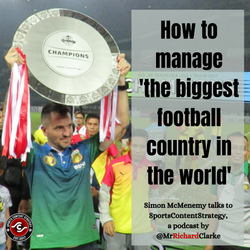
62. Simon McMenemy: How to manage 'the biggest football country in the world'
01:41:24||Season 1, Ep. 62TOPICSHow he went from being assistant manager of Worthing to head coach of the PhilippinesHaving Ronaldinho on his CVThe decisions you have to make if you want to be a coach but have not had a high-profile playing careerHow Simon has educated himself after taking a fast-track into the practical side of coachingCoaching a team when you do not speak their languageThe difference between coaching in SE Asia and EuropeThe smaller size of footballers in SE Asia and the effect on coaching and playing styleHow he won the Indonesian League with BhayangkaraPutting the league title victory with a small club into contextThe infrastructure behind Indonesian teams - how teams are funded and supportedHow Simon was approached to be the national team manager for IndonesiaThe crazy adulation that surrounds the Indonesian national team and its managerWhy Simon knew the World Cup draw would he cost him his jobThe problem of short-termism and fan pressureSpecific communications issues in the Philippines and IndonesiaThe crowd trouble that flared up late in the crucial game against MalaysiaThe insecurity of football in Indonesia and its effect on family lifeIs success in SE Asia transferable? Will it help get jobs in other countries.Why is Indonesia not able to transfer its talent to Europe - early football education, passports etcThe Beckham of Indonesia who is currently playing in the reserves at Lech Posnan in PolandTwo longer-term improvements the Indonesian FA could implement nowThe battle between a strong league and strong national teamThe strong teams in SE Asia right nowWhat would a World Cup in SE Asia do for the sport in that area - “It would be sold-out the minute it was announced”The corruption in Indonesian footballStories about the passion of Indonesian fans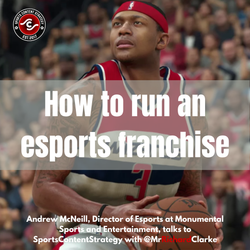
61. Andrew McNeill: How to run an esports franchise
55:52||Season 1, Ep. 61TOPICSAndrew’s background - the SXSW conference (sports and gaming)His role as GM and Sporting DirectorThe financials of the 2k League and the player contractsThe great validity of 2K in esports as every on-court player is controlled by a human.Sponsorship - is it easier to be attached to a traditional sport because of the existing franchise infrastructure and the familiarity of the sport?The relationship between the traditional sports franchises and the esports onesSharing resources with a traditional sports team - psychologists, analytics teamsThe environment created for esports players to excel - nutrition and physical trainingThe rule preventing cross-over and collaborationThe importance of storytelling around esports playersThe journalistic challenge of getting engaging narratives from young peopleThe ESPN deal taking the 2K League on linear TV for the first timeLeveraging traditional Wizards fans into their club’s 2K franchiseMichael Jordan’s ownership of the new 2K franchise in CharlotteThe new Shanghai franchise and the opportunities it createsThe importance of having a geographical home and tournamentsThe venue question. Will esports regularly fill up stadiums?Barriers of entry for a generation that ‘won’t pay for content” - or will they?The hockey franchise - the response to launching their own tournamentDo they make money?The importance of the Gretzky v Ovechkin charity esports gameHow the draft worksThe allocation of positions in the esports draftThe mechanics of trading a player in esports
60. Jesse Cole: How to REALLY put your fans first
01:04:53||Season 1, Ep. 60TOPICSIntroducing the Savannah Bananas, the lowest level of baseball in there USWearing a yellow tuxedo every day"We are not in the baseball business, we are 1000% in the entertainment business"Why he has no marketing budgetThe all-you-can-eat deal to stop you getting "nickel and dimed"Eliminating friction-points for the fanWhy they have no advertising and, as of February 2020, no partnershipsThe decision to name the team the Savannah BananasTaking over from a historic baseball outfit where Babe Ruth playedWhy having fun is your best business strategy and has improved home performanceThe type of coach that copes with the showbizHow does Jesse hires his staffThe concept of the director of first impressionsCan an introvert work for the Savannah Bananas?The legend of Bill VeeckWhat opposition owners and players make of the Bananas?Why the Bananas perform better than the average team in comparison to other teams in the LeagueCreating the right working culture among staffWhy the staff are paid to readThe policy of hiring young and where older staff fit inWho does Jesse consider as competitors to his shows?Is the Savannah Banana's model transferable?How stories are deliberately cultivated to reflect cultureWhy you can only judge you marketing by shareablity?Would learning marketing have actually hampered Jesse's ability as a marketerWhat experiments have failed and at what point were they abandoned?The concept of being 'the only'Lessons from Walt DisneyWhere he wants to take the Savannah Bananas in the future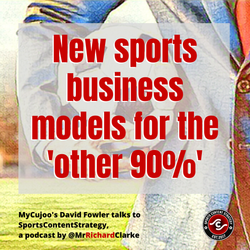
59. David Fowler: New sports business models for the 'other 90%'
46:05||Season 1, Ep. 59TOPICS What sort of sporting environment will we see after the lockdownDavid's top 3 - more creativity, virtual communities, the acceptance of lower quality contentHis worries for sports at non-league levelThe background to MyCujooThe opportunity in the new realities of sport in the post-Covid-19 worldHow can MyCujoo assist a non-League club, leagues and federationsMonetising tools with MyCujooThe crucial aspect of building communityWhy not use YouTube or Facebook insteadThe opportunity to test new sports business modelsThe opportunity for playersWorking the federations and leagues for a centralised production approachHow the Netherlands is coping with Covid-19Rebuilding sport in a better way, not the same wayPRESENTING PARTNERInternational Football Business InstituteGet the most wanted degree in the football industry . The Postgraduate Course in International Football Business prepares young people for an executive career in the football industry. This year-long course is operated by IFBI accredited by the University of Brussels and based in the Belgian capital. The Course is limited to 20 participants per years and t fee includes six field trips to top European organisations plus a host of guest lecturersMeanwhile, the Master Class in International Football Business is designed to help established executives to strengthen their strategic thinking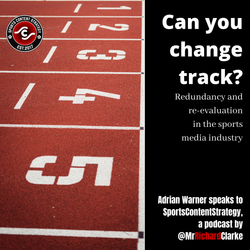
58. Adrian Warner: Redundancy and re-evaluation in sports media after COVID-19
01:03:59||Season 1, Ep. 58Adrian Warner Like everything else, the sports media industry may be irrevocably changed in the wake of the Coronavirus crisis. The loss of matches, Tests, bouts and races has not only affected players, clubs and leagues but made an immediate impact in related industries such as media, broadcasting, hospitality and gambling. Adrian Warner went through a significant change in his career a few years ago when he was made redundant from his role as a sports reporter for the BBC. He wrote a book about how to handle the emotional and practical side of having to change when your job ends. From coping with anger, dealing with former colleagues to getting your CV ready to re-enter the job market and understanding what really makes you happy, Adrian has many lessons for those who may be affected by the economic issues that follow COVID-19 TOPICSWriting his book on coping with redundancy Lessons for the current coronavirus crisis Getting out in front of the problem Dealing with the emotions of a job change Learning to accept that anger will never go away completely Ignoring the social media skills of older people The cull of older journalists in the search of a youthful audience The attention span issue - does that affect the way sports media is taught today? The importance of 'reading long' and looking for analysis Why the podcast movement is an indication of the importance of depth Radio is the medium you consume while doing something else Concerns about the sports industry and the sports media industry going forward - "It is very hard for sport to continue in the same way" The positive possibilities for sports after Coronavirus The positive developments that have occurred from Adrian's life change The law of diminishing returns in sports media, even in going to World Cups and Olympics Turning your hobby into your job His advice for students at the end of their course "Use this as a moment to change direction in a positive way" LINKSAdrian Warner Twitter | LinkedIN | Website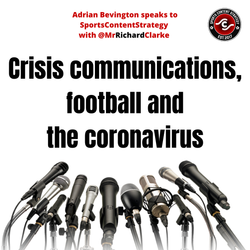
57. Adrian Bevington: Crisis communications, football and the coronavirus
56:32||Season 1, Ep. 57TOPICSThe communication principles to use in the coronavirus crisisThe differences of approach around European footballRights and wrongs of a holding statementThe possible repositioning of football after we return - “We could be a better society at the end of this, one where we are kinder”Reframing the narrative around the gameCollaborative working between clubsLooking back at changes during Adrian’s time as Director of Communications for the England teamThe first Twitter World CupThe influence of Gareth Southgate in England’s recent PR revivalThe change in newspapers’ influence and tone in recent decadesHow England players like Lampard, Gerrard etc learnt to handle the mediaThe rigours of the role - being on call 24/7, arguments, powerful personalitiesHow to use social media to correct negative storiesThe move to become MD of Team EnglandThe rarity of moving into a leadership role with a background in communicationsIn the post-coronavirus football world will the leadership of football clubs lean more to communications and community?Moving to the FA of Wales for this their successful EuroThe pressure of certain countries/club and how that can stifle joyExtrapolating a positive culture when you have a great leaderValues - creating them and communicating them. “Values are not just words, Values are what you live”Having stretch targets and creating transparency with supportersThe pressure of success and how that affects valuesAdrian’s key tips for sporting organisations when we emerge from the coronavirus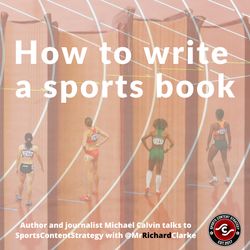
56. Michael Calvin: How to write a sports book
01:21:22||Season 1, Ep. 56Why did he choose to move into authorship?How has he chosen the subjects for solo projects?How did the fly-on-the-wall book about Millwall develop?Becoming part of the team and understanding their problems and insecurities - “It had to be warts-n-all”Having faith in yourself and self-publishingThe modern battle between the written word and video - “Access is just another product to be commercialised”Why TV is ‘fast food’ but writing a book is a ‘four-course meal’How the book about scouting beganWhy the title is key? - “You can sell a book on a title”The importance of questions - having them at the start of the process and do they evolveWhat his book on managers taught himEmphasising the humanity of the individualThe writing process - when to interview, when to writeSelling the book yourself - “don’t underestimate the power of mateship”Journalists are now brands in their own rightQuality journalism v modern churnalismThe exploitation of young players in No Hunger in ParadiseHas the growth of sports business made the game inhumane?The Americanisation and corporatisation of footballHow the Accrington Stanley management team know 400 supporters by their first name“Because my dad does” is the essence of footballThe purity of non-League footballThe tipping point for arrogant clubs who disregard the customerThe art v science debate raging at football clubsCo-writing books with famous athletes - the honest and painWhy he had to sleep in Gareth Thomas’ bed when writing his bookThe key question about his sexuality and the place he had picked for his suicide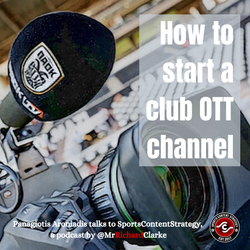
55. Panagiotis Aroniadis: How to start the first club OTT channel in Europe
51:00||Season 1, Ep. 55The origins of the PAOK OTT platform and the issues with the broadcasting dealLearnings from the first two years when the service was going only to overseas fans"The final decision was taken just a week before the first game"Solving problems - marketing, paywalls and the payment mechanismThe biggest issues - connectivity in remote areasThe problems of a late rush for the banking systemThe use of smart TV apps and rolling it out across bars and coffee shopsHow they made their pricing decisionsIs it profitable?The opposition and criticism they faced in the football industryWhy other clubs have approached them about their serviceThe production qualityThe reaction among the fans, including the senior ones who may not be so digitally -able?How have PAOK staffed up?Why the circumstances were right for this to happen in Greece and at PAOKOther digital innovations to develop the PAOK brandThe buy-in from the owner and the boardBucking the trend and moving into high-quality 'coffee-table' magazinesThe 765-page magazine that PAOK sold for 40 EurosThe international strategyDefining the tone of voice for the clubHandling the biggest game of the season - Olympiakos at homeReflecting the fans in their communicationsHow PAOK has continually grown its fanbase despite going 34 years between title winsPlans for the future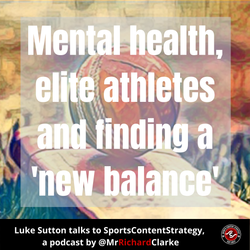
54. Luke Sutton: Mental health, elite athletes and finding a 'new balance'
59:21||Season 1, Ep. 54Why did he take such a brutally honest approach to telling his storyThe early signs of his alcohol problemsWhy the strength of the athletes' personality can be a problemThe imposter syndrome of being 'just good enough to survive'... so he won all the fitness testsReplacing a legend in the Lancashire side and the pressure that createdThe intervention that led to his spell in the PrioryMeeting characters like 'Lenny'The pressurised world of the athletes and how it is not that different from the general publicThe reaction inside sports and outside sports to his problemWhy sport has to do better in its reaction to mental healthHas his experience made him a better agent?How would Luke have coped with social media in his playing days?How did Luke's family cope with his story going public?Writing out his problems v Talking out his problemsThe worrying statistics on cricketing suicidesThe particular problems of a cricketer's retirementCould Luke leave cricket behind?Why society has to change its story of successHave athletes come to him about their mental health after the bookSpotting problems earlier thanks to his experienceBeing prepared to 'leave money on the table' in order to look after a client's mental healthHow he started his agencyThe reaction of young people to his book compared to the older generationsLessons outside of sports from Luke's storyHow does sport have to change in the long term